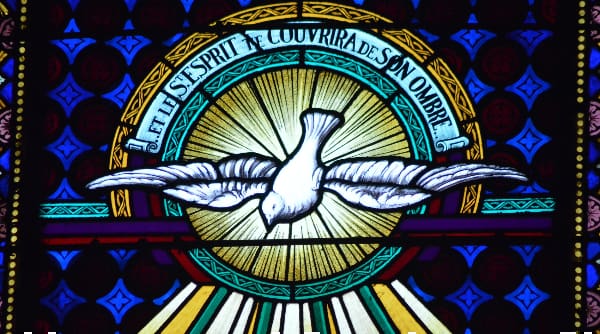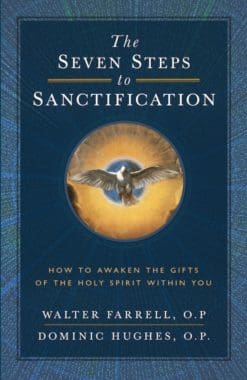The Gifts for Glory
Swift Victory
“Hurry up and wait” is now a familiar call in battle. On decks, in dug-outs, or at the council tables of foreign ministers of the hot and cold wars, the same “stand-by” order is a commonplace. In a struggle for power, or at least for an advantageous position, not only the military but most of the populace knows the breathless tension of headlong preparations and the maddening strain of tactical restraint. For most, there is a mounting temptation to plunge into any possible snare or ambush rather than to crouch, peering into darkness, looking for they know not what. Yet the waiting is just as necessary to the attack as the hurrying, since only those wise in the ways of war and of peace can command the hour and the action that leads to sure and swift victory.
For those who “take up the armor of God” (Eph. 6:13) in the spiritual warfare of Christian life, “Hurry up and wait” is an unspoken but well-understood order of the day. As their never-idle Charity increases from grace to grace, it gathers momentum. At first, the efforts of those new-born of God, or of those with a renewed awareness of their rebirth, may be erratic. They may hurry to do many spiritual things, as various devotions, penances, or practices come to their attention. As true fervor grows, however, the encircling bond of Charity draws more and more to its own quiet, calm, but intense movement. All things gradually come together for a single final drive heavenward. Yet the more Charity moves to renewed effort, the more it awakens the soul to the knowledge that the distance is infinite and that it is not a question “of him that willeth, nor of him that runneth, but of God that showeth mercy” (Rom. 9:16). By its awareness of the all-pervading mercy of God, the Charity of devout souls is not cooled. Nor do they hurry “as if” all depended upon themselves and wait “as if” all depended upon God. In both the urgent preparations for waiting and in the waiting itself all does depend upon both God and men, or rather upon God in men, since “our sufficiency is from God” (2 Cor. 3:5). By His grace which admits and includes the cooperation of men, God urges and enables souls to hurry up by practicing the virtues that prepare for victory. By His grace which operates in men to make them docile to the promptings of the Holy Spirit, God gives the calm and the confidence for waiting until the Holy Spirit Himself gives the command at the hour and for the action that leads to sure and swift victory.
In both the hurrying and the waiting, it is the “grace of our Lord Jesus Christ, and the charity of God, and the fellowship of the Holy Spirit” (2 Cor. 13:13) in which all Christians “live and move and are” (Acts 17:28). Because their existence, their movement, and their life with God are as yet in the world, they cannot hope for a swift victory in terms of hours or days. Nor can they expect more than a share in their final triumph while yet they are in the midst of trials. Yet even the anticipation of everlasting peace is a greater triumph than nature could promise or provide. The world can foresee a single, sweeping solution only at the price of the abasement or even annihilation of men and their efforts. In an atomic war, the solution to problems is quite simple, but there are no heroes, and an unknown scientist rather than an unknown soldier would be awarded the charred ruins of nations as his triumphant monument. In any merely materialistic or naturalistic pattern of attack, there is one or another limited victory to be gained, and likewise, only one way to attain it. Men must become proficient in a specialty, and they must be prepared to dehumanize themselves to be happy with what they might attain. In the ways of God, there is one final victory, but there are many ways of attaining it. By His grace, souls are versatile in the ways of combat and confident of “triumph in Christ Jesus” (2 Cor. 2:14). With a foretaste of victory through Faith and Charity, and with an experience of the ways of the “God of peace” through His Gifts, they are able and willing to engage in the work and the waiting of a whole lifetime of spiritual combat, “to resist in the evil day, and to stand in all things perfect” (Eph. 6:13).
Motionless attention in perfection is possible only to victorious souls in Heaven. When their intellect’s gaze is fixed on the vision of the Divine Essence and their will is pressed hard upon its happiness, souls stand in all things perfect. Although no creature, even the human soul of Christ, can comprehend the Infinite or love God as much as He ought to be loved, souls that see and enjoy His presence act to their full capacity at all times. There is no “at ease” during eternal rest, no falling out of line from the adoration of God. Absolute attention is required and is quite easy. No distractions can trouble souls, no fatigue overcomes them. They are at rest in the peak of their activity. In such perfection, the mirror-view of Faith has no place, and the will no longer has its begging hand out in Hope, since minds and hearts are filled. On the other hand, “Charity never falleth away” (1 Cor. 13:8). It goes on the same forever, altered only in its intensity, since it now sees what before was behind a veil. Likewise, all the other good habits whose nature involves no imperfection, and which can change their conditions for acting without being lost, remain with Charity, so that the soul may have an integral perfection.
In that heavenly standing in all things perfect, the moral virtues have a place. There are no occasions of sin which would require moral virtue to resist temptation, yet there is an opportunity for the tranquil and continual practice of moral virtue. The order of reason, a renewed and imperturbable prudence as it were, dominates all the elements of heavenly life and gives to each its proper attention. Temperance moderates the soul in the midst of ineffable joys with the most profound humility; fortitude gives even the lower appetite the strength to adhere to God for all eternity; and justice guarantees an eternal submission. Just as the order of reason remains in the moral virtues, although the matter for merit is gone, so in the relationship of souls to the Holy Spirit, with even more reason, His Gifts perdure.
In the motionless activity of Heaven, where God is “all in all” (1 Cor. 15:28), the Gifts reach their unimpeded consummation. The bond that links them together is the same as that which unites the soul to God: Charity, which never fails. Although the human deficiencies of thought and love no longer require a supplement from the Holy Spirit, the Gifts enhance the fruition of divine truth and love by making souls “in all things perfect” and like God. Understanding does not so much penetrate as possess first principles as they are present in the Divine Mind. Knowledge judges of created causes in the new context of God’s Providence clearly seen. Wisdom, no longer in darkness, vividly experiences the kiss of the divine mouth, and all desires sleep, but the heart watches so that all things remain in order (cf. Song of Sol. 1:1; 5:2). Counsel has the happy task of governing associations in the company of the saints, and it sets the norms for the affective Gifts. Piety glories on high in Him who is above all praise. Fortitude is a feeling of divine power, and Fear is a filial reverence toward the Heavenly Father, infinitely exalted above all His saints. By all of these Gifts, souls “stand in all things perfect” in a truly divine way as “members of God’s household” (Eph. 2:19), enjoying the perfect peace of unending triumph.
+
This article is adapted from a chapter in The Seven Steps to Sanctification by Walter Farrell, O.P. & Dominic Hughes, O.P. which is available from Sophia Institute Press.
Art for this post: Cover and featured image used with permission.





